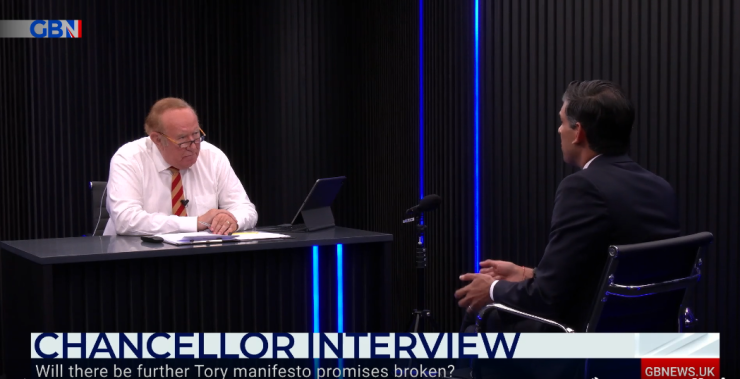Screenshot: Can GB News survive the ad boycott backlash?

This week
**Media Moment of the Week: Richard Madeley goes full Partridge
**Can GB News survive the ad boycott backlash?
**London’s bumper fintech float: a Wise move
Media Moment of the Week: Richard Madeley goes full Partridge
It’s always risky when producers attempt a comeback of an old show, so I was sceptical when I heard Alan Partridge would be returning for a new series in which the washed-up presenter stars as co-host of a popular TV show. Turns out I was wrong. GMB is great.
Can GB News survive the ad boycott backlash?
After months of excitement, tension and a whole lot of bad blood, GB News finally launched on Sunday night and – well – it’s been eventful. The boisterous new broadcaster has already suffered a litany of technical problems, a flood of Ofcom complaints and an advertising boycott. The channel’s detractors have reacted with gleeful schadenfreude (an account dedicated to its bloopers has already racked up more than 30,000 followers), but whatever your views on the channel, you can’t say it hasn’t had an impact.
Stepping back from the noise, however, what does all of this really mean? Much focus has been placed on the advertising boycott after a slew of brands including Ikea, Grolsch, Nivea and Indeed pulled ads from the channel. In reality, though, there seems little here to worry the execs over in Paddington.
The network’s advertising is run by Sky Media, which handles ads for hundreds of different channels. Adverts are placed according to target audiences (which is why so many brands were surprised to see their campaigns on GB News) though businesses can request to avoid certain channels or programmes. This means there’s a huge pool of potential advertisers clamouring for a spot on the channel and while some may kick up a fuss, it’s likely the majority are going nowhere.
What’s more interesting is GB News’ plan to introduce some kind of subscription service, where paying users are granted access to additional content. At a time when ad revenues are shaky at best, this is a smart move. But while there will undoubtedly be a loyal section of GB News’ audience that is happy to subscribe no matter what, it’s here that the technical issues may start to take their toll.
GB News is a startup that has been scrambled together in a relatively short period of time and some technical glitches are to be expected (and will, presumably, be ironed out before too long). That said, it has some serious work to do. From gloomy sets and microphone failures to repeated chyron typos, there’s been a string of unforced errors that have continued through the channel’s opening week. While viewers may be prepared to overlook these when tuning in on TV, they pose serious questions about how it can demand payment through a subscription service.
It is, of course, early days for the nascent channel. Already it has made waves (Andrew Neil’s textbook grilling of Rishi Sunak generated headlines this week) and it will no doubt continue to improve. But the advertising boycott seems little more than posturing and distraction, and frankly GB News has much bigger problems to contend with. If it’s going to demand payment from viewers, and guarantee its future in the long run, it needs to prove it’s worth it.
London’s bumper fintech float: a Wise move

London’s IPO market has been on a wild ride this year. There’s been a flurry of activity as a string of high-profile companies including Darktrace, Moonpig and Musicmagpie have looked to cash in on their pandemic success by going public. Made.com will soon list in the capital, while plenty more floats are rumoured to be in the pipeline. Yet dismal debuts for Deliveroo and Alphawave have raised fears of troubles in the market, and several IPOs have been cancelled in recent weeks.
Enter Wise, the London fintech darling formerly known as Transferwise, which has confirmed plans for a listing in the coming weeks. The float could reportedly value the company at as much as £9bn, making it one of the capital’s largest stock market debuts this year. It will also be the first direct listing of a tech firm in London and is using a dual-class share structure – signals that it’s bringing popular Silicon Valley practices to Blighty.
In doing so, Wise is demonstrating a bold show of confidence in London as a destination for stock market debuts. Chancellor Rishi Sunak has been pushing for reforms to the capital’s listing regime to entice more tech companies, but Deliveroo’s lacklustre performance raised serious questions about investors’ appetite for tech floats (something I wrote about at the time). The growing trend of US Spac listings for firms such as Cazoo and, more recently, Babylon Health, have been an added blow.
Yet Wise’s decision to list in its hometown (its Estonian founders set up shop in London in 2010) offers renewed hope for the capital. After Deliveroo’s flunked float, all eyes will be on Wise. If it can pull off its listing, it may just spark an influx of interest in the capital’s thriving tech scene.
The algorithm recommends
- Joe Biden has tapped prominent tech critic Lina Khan to lead the UK competition watchdog. Here’s a lowdown on Khan, America’s answer to Margrethe Vestager.
- The value of British music sales and streams hit a record high last year, mainly due to a streaming-induced surge in song rights.
- ICYMI – I talked to the London ad firm that’s using AI to place products in films and TV shows